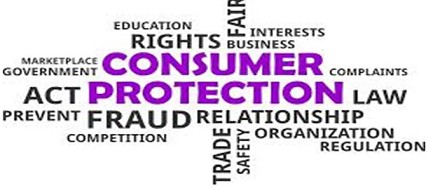INTRODUCTION
Even after seventy three years of Independence, the consumer is the most exploited segment of Indian society. During the British rule, the colonial rulers exploited the Indian consumers to serve their own interests. He was cheated and fleeced that the wealth may continue to flow into Eng-land, the homeland of the imperialist rulers. However things didnít change even after inde-pendence. The consumer continued to be ex-ploited and cheated in various ways by the trad-ers, manufacturers and industrialist. He was cheated both in quantity and quality of the goods he purchased. In todayís economy the firms are competing to sell their goods and ser-vices to the consumers by adopting unfair trade practices in order to exploit them. Consumers are a weak party in buying goods and services as compared to the manufacturers and traders. The consumers are being attracted by the false advertisements exaggerating the content, quality and effects of their goods and services, they require legal support against such exploitation. For that reason, legal authority is needed for the protection of the consumerís rights, by punishing the offenders.
Consumers in the developed countries are much more conscious of their rights than developing countries. But in countries such as India, because of poverty, illiteracy and lack of awareness of le-gal rights consumers are helpless for defective and unsafe products. As a result, manufacturers and suppliers of goods and services generally exploit the consumers by adopting unfair trade practices.
CONSUMER AND THEIR RIGHTS:
.A consumer is as a person who buys any good or avails a service for a consideration. He is not a person who obtains a good for resale or use a good or service for commercial purpose. It co-vers transactions through all modes including offline, and online through electronic means, teleshopping, multi-level marketing or direct sell-ing. As a consumer, we are protected against market malpractices, illegal trade practices and exploitation in various forms through six im-portant consumer rights. In a growing economy like our country, it isnít unusual for us to face these abuses mostly due to aggressive competi-tion among a multitude of products and services. It is therefore vital for each of us to be alert by being knowledgeable about consumer responsi-bilities in India.
Six consumer rights which have been defined in the Consumer Protection Bill, and those are:
Right to Safety , Right to be Informed, Right to Choose, Right to be Heard, Right to Seek redressal, Right to Consumer Education
Right to Safety:
The consumers have the right to be protected against the marketing of goods and services which are harm-ful to life and property, this right is important for safe and secure life. Sometimes the manufacturing defects in pressure cookers, gas cylinders and other electrical appliances may cause loss to life, health and property of customers. This right to safety protects the con-sumer from sale of such hazardous goods or services.
Right to be informed:
The consumer has the right to get information about the quality, quantity, purity, standard and price of goods or service so as to protect himself against the unfair practices. It is the duty of the producer to give the information.
Right to Choose:
Consumer has the right to choose the goods or ser-vices of his choice. The producer or supplier should not force the customer to buy a particular brand only. Consumer should be free to choose the most suitable product from his point of view.
Right to be heard:
The consumer has the right to be heard for his inter-est. If a consumer has been exploited by the use of goods or services, he has the right to be heard and will receive due consideration. Under this right the companies must have complaint cells to attend the complaints of customers.
Right to seek redressal:
The consumer has the right to get compensation against exploitation. This right assures justice to con-sumer against exploitation. This right includes com-pensation in the form of money or replacement of goods or repair of defect in the goods as per the sat-isfaction of consumer. Various redressal forums are set up by the government at national level and state level.
Right to Consumer Education:
This right imposes a duty on the seller to inform all the details of their product to the customer. The gov-ernment of India has included consumer education in the school curriculum and in various university cours-es. Government is also making use of media to make the consumers aware of their rights and make wise use of their money.
So, now in addition to the existing consumer rights, there are five new consumer rights you get as a con-sumer under The Consumer Protection Act 2019.
1. Right to file a complaint from anywhere
The consumers can now file a complaint with the District Consumer Commission or State Consum-er Commission from anywhere, home, office or while on a weekend trip. Presently, the consum-ers are required to file a case only at the place where the product was purchased or where the seller of the product has his registered office. The consumer affairs ministry will now frame rules for electronic filing of complaints and specify norms for paying the required fee digitally. This will re-duce harassment of consumers to a great extent.
2. Right to seek compensation under product liability
Any individual can file a case against the manufactur-er or seller of a product for any loss caused to him by a defective product or services. If there is a manufac-turing defect or the product does not have the ex-press warranty the manufacturer or the seller will be held liable. This provision brings e-commerce under its ambit.
3. Right to protect consumers as a class
If you have a complaint that relates to violation of consumer rights or unfair trade practices or mislead-ing advertisements that are damaging the interests of consumers as a class, you can do two things. Forward the complaint in writing or in electronic mode to dis-trict collector or the commissioner of regional office or the Central Consumer Protection Authority (CCPA) for class action.
4. Right to ask a hearing using video conferencing
Any complaint will be presented before the district commission based on an affidavit and documentary evidence placed before it. If an application has been forwarded by a consumer for hearing through video conference, the commission can allow for this provision.
5. Right to know why a complaint was rejected
Commission cannot reject a complaint without hear-ing the complainant. The commission, must decide about admitting or rejecting a complaint within 21 days, if it is not decided then the complaint is admitted.
Conclusion:
We can conclude that the consumers should be edu-cated and made aware of the rights and responsibili-ties that are available to them. Various efforts like campaigns, advertisements should be initiated by the government so that more and more consumers are made aware of their rights and responsibilities. . Con-sumer Education aims to empower, enable, equip the consumers and provide those tools of self-reliance. Empowered consumers make optimal decisions, know their rights, and can complain and seek redress when their rights are violated. Consumer Education also benefits the society by creating more active and informed citizens






